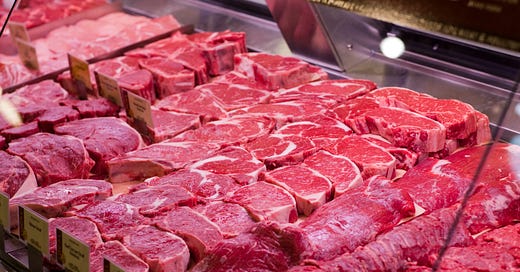We Need to Protect Our Meat-Processing Workers
The new Trump executive order on the meat industry puts both workers and the companies they work for at risk.
The president’s latest executive order declaring that meat-processing plants must remain open through the pandemic puts both workers and the meat companies they work for at risk, which this administration has done next to nothing to prepare for. I know something about meat processing, having served on the board of what was for a time the largest poultry producer in the nation, Pilgrim’s Pride. The company, badly hurt by the 2008 stock market collapse, went into bankruptcy from which it emerged when JBS SA, a Brazilian-based company, purchased it in 2009. Its subsidiary JBS USA is now one of the biggest meat companies in the world and owner of many of the plants infected by COVID-19. During my time on the Pilgrim’s Pride board, I learned a lot about how chickens get from farms—many of them relatively small, family-owned businesses in rural areas—to grocery stores and restaurants across the country. It is a vital but not always pretty process, with literally hundreds of thousands of low-paid workers doing the difficult and often dangerous work cutting up carcasses along a fast-moving assembly line in large, frigid plants.
During my time on the board, I visited the company’s plants in Texas, where employees worked in shifts that sometimes went round-the-clock. They showed up to work, punched in, donned their gear (at the time, overalls, gloves, and hairnets) in locker rooms with little space to spread out at a safe social distance. They stood shoulder-to-shoulder on the line that fed carcasses or chicken parts to be cut up, de-boned, internal organs removed from the cavities and repackaged, and sometimes skinned, depending on the customer, with excess skin and stray bits dumped in large plastic vats at the end of the line to be used in preparing those fried nuggets kids crave. Hands moved with such rapidity it was hard to imagine how the workers managed not to cut off fingers—and workplace injuries, including repetitive movement stress were far from uncommon.
When I visited the plants in Texas, most of the workers were Hispanic, often immigrants who spoke little English. Although Pilgrim’s Pride was an early adopter of E-Verify, the voluntary government program that allows employers to check applicants’ eligibility to work under our immigration laws before they are hired, many of the company’s workers were undocumented. Most of these had fake Social Security numbers or had been hired before 2003 when the federal government expanded E-Verify nationwide. An ICE raid on several of our plants in 2008 resulted in some 400 arrests, dealing a heavy blow to operations and accelerating bankruptcy when attempts to hire suitable replacement workers largely failed. All of which is to say, when meat processors get sick, companies won’t have an easy time finding others to take their jobs.
As of this week, large outbreaks of COVID-19 have infected hundreds of workers and killed at least 22 in plants across the country, according to a report by USA Today and the Midwest Center for Investigative Reporting. Some jurisdictions have forced the plants to close temporarily while companies scrambled to put in place a more protective environment. At some plants, companies have erected plastic barriers between workers to help mitigate the risk and required workers to wear masks in addition to their regular gear, but the most significant protection for workers is sorely lacking—namely, testing. Until companies can test every worker who walks through its doors in real time, workers will continue to be put at undue risk. And yet, the president has no plans in place to ensure that the tests will be made available at the worksites, along with the personnel to administer them quickly and reliably.
The president claims that meat processors are a vital part of the critical infrastructure during a national crisis, though he has been slow to invoke the Defense Production Act in other crucial areas, including producing protective equipment and testing supplies. And his refusal to take responsibility on these fronts is what makes his actions now even more irresponsible. Instead of taking direct action to guarantee testing and protective equipment for workers, the president punted to the Department of Agriculture to ensure companies operate “consistent with the guidance for the operations of meat and poultry processing facilities jointly issued by the CDC and OSHA.” This “guidance” is just that, nothing more than suggestions that companies should follow, with no enforcement mechanism if they don’t. And by requiring the companies remain open, even if there are further outbreaks—which there are bound to be—the president is essentially depriving local officials of the ability to shut down plants that pose a threat not just to workers but the community at large. The threat of a shutdown is the most effective way to ensure companies act responsibly. But what does acting responsibly even mean when the president of the United States orders companies stay open, period?
In Greeley, Colorado, local officials shut a JBS plant on April 11 after some 277 workers became infected, and the plant was originally to stay closed until April 27, but instead it reopened on April 24. The company appears to have followed the CDC guidance, checking workers’ temperatures before they entered the plant and asking that they wear masks, in addition to having deep-cleaned the facility and installed plastic shields between stations. But given the fact that many patients are asymptomatic, some of the returning workers may well be infected and will infect others. A company spokesman said that the federal government had provided 50,000 masks for employees but not tests. JBS purchased its own tests—but not enough to test all workers on a repeated basis—and a union representative for the workers claimed on MSNBC that the company quit testing front-line workers after as many as 40 percent of managers tested positive at the company’s test site over the Easter Sunday weekend.
Companies like JBS want to do right by their employees. It has been my experience in nearly 30 years serving on corporate boards that management understands that the success of the company depends on its workers’ well-being. But companies need the right tools to do the right thing, and President Trump and his administration aren’t helping. The president is putting the cart before the horse in forcing meat plants to stay open before he can guarantee they have the tests to ensure it is safe to do so.











